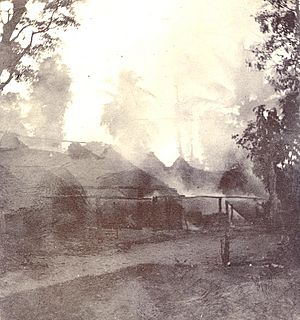Anglo-Aro War facts for kids
Quick facts for kids Anglo-Aro War |
|||||||
|---|---|---|---|---|---|---|---|
| Part of the Scramble for Africa | |||||||
 A photograph of Arochukwu burning |
|||||||
|
|||||||
| Belligerents | |||||||
| Commanders and leaders | |||||||
| Strength | |||||||
| 1,637 | 7,500+ | ||||||
| Casualties and losses | |||||||
| ~700–800 killed or wounded | Heavy | ||||||
The Anglo-Aro War was a fight between the Aro Confederacy and the British Empire. It happened in what is now Eastern Nigeria. The war lasted from November 1901 to March 1902. It started because of growing disagreements between Aro leaders and the British. They had tried to talk things out for years, but it didn't work.
Contents
Why the War Started
The Aro Confederacy was very powerful. Their influence spread across Eastern Nigeria and beyond. But in the late 1800s, the British started moving into the inland areas. This challenged the Aro's power. The Aro people and their friends didn't want the British to take over. This was for several reasons, including money, power, and religious beliefs.
The Aro people used special religious practices. They had shrines dedicated to a god called Ibin Ukpabi. These practices helped them control trade and influence many communities. The British wanted to stop this control. This was one of the main reasons the Anglo-Aro War began.
Aro Resistance to British Rule
The Aro people had long been against the British taking over their land. One big reason was money. They also didn't like British missionaries trying to bring Christianity. This new religion threatened the Aro's own religious power, which came from their oracle, Ibini Ukpabi.
Since the 1890s, the Aro led attacks on communities. They did this to stop the British from spreading their influence. In November 1901, the British were getting ready to invade Arochukwu. Before this, the Aro launched a big attack. Aro forces, led by Okoro Toti, attacked Obegu. Obegu was a British ally. About 400 people died in this attack. This made the British speed up their plans for invasion.
The British Expedition Against the Aro
Sir Ralph Moor and the Royal Niger Company had planned to attack the Aro and their Ibini Ukpabi oracle since 1899. But they didn't have enough soldiers. So, the attack was delayed until November 1901.
On November 28, Lieutenant Colonel Arthur Forbes Montanaro led the British forces. He had 87 officers, 1,550 soldiers, and 2,100 carriers. They moved towards Arochukwu from four different directions. These starting points were Oguta, Akwete, Unwana, and Itu. The goal was to stop the Aro's resistance.
As expected, Aro forces fought back strongly in all areas. But they did not have modern weapons. Even so, they put up a fierce fight. Arochukwu was finally captured on December 28. This happened after four days of intense battles in and around the city. The Ibini Ukpabi shrine was reportedly destroyed.
Battles between the British and Aro forces continued across the region. This lasted until spring 1902. The Aro forces were finally defeated in the last major battle at Bende. The British expedition ended three weeks later.
What Happened After the War
Some Aro leaders, like Okoro Toti, were caught. They were put on trial and executed. The Aro Confederacy quickly lost its power. Eze Kanu Okoro, who was the king of Arochukwu, went into hiding. He was later arrested.
Even though the Aro's main power ended in March 1902, many Aro people kept fighting. They used guerilla tactics against the British. These small, surprise attacks happened in places like Afikpo (1902–1903) and Ezza (1905). These were areas where the Aro had a strong presence.
The British victory helped them open up the interior of Nigeria. However, strong resistance to British rule in Igboland did not end with this war. In the years that followed, the British faced many other conflicts. These included the Nri Conflict (1905–1911), the Ekumeku War (1883–1914), and the Igbo Women's War (1929).
Major Battles of the War
- Battles in the Oguta/Owerri area (November 1901)
- Battles of Esu Itu (December 1901)
- Battles of Arochukwu (December 1901)
- Battle of Edimma (January 1902)
- Battle of Ikotobo (January 1902)
- Battle of Ikorodaka (February 1902)
- Battle of Bende (March 1902)
 | Ernest Everett Just |
 | Mary Jackson |
 | Emmett Chappelle |
 | Marie Maynard Daly |

